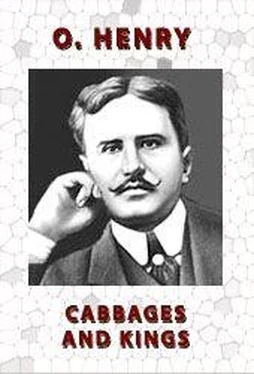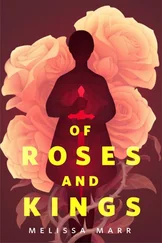O Henry - CABBAGES AND KINGS
Здесь есть возможность читать онлайн «O Henry - CABBAGES AND KINGS» весь текст электронной книги совершенно бесплатно (целиком полную версию без сокращений). В некоторых случаях можно слушать аудио, скачать через торрент в формате fb2 и присутствует краткое содержание. Жанр: Классическая проза, на английском языке. Описание произведения, (предисловие) а так же отзывы посетителей доступны на портале библиотеки ЛибКат.
- Название:CABBAGES AND KINGS
- Автор:
- Жанр:
- Год:неизвестен
- ISBN:нет данных
- Рейтинг книги:4 / 5. Голосов: 1
-
Избранное:Добавить в избранное
- Отзывы:
-
Ваша оценка:
- 80
- 1
- 2
- 3
- 4
- 5
CABBAGES AND KINGS: краткое содержание, описание и аннотация
Предлагаем к чтению аннотацию, описание, краткое содержание или предисловие (зависит от того, что написал сам автор книги «CABBAGES AND KINGS»). Если вы не нашли необходимую информацию о книге — напишите в комментариях, мы постараемся отыскать её.
CABBAGES AND KINGS — читать онлайн бесплатно полную книгу (весь текст) целиком
Ниже представлен текст книги, разбитый по страницам. Система сохранения места последней прочитанной страницы, позволяет с удобством читать онлайн бесплатно книгу «CABBAGES AND KINGS», без необходимости каждый раз заново искать на чём Вы остановились. Поставьте закладку, и сможете в любой момент перейти на страницу, на которой закончили чтение.
Интервал:
Закладка:
When the captain had departed Dicky called the sergeant of the jail squad and asked:
"Am I ~preso~ by the military or by the civil authority?"
"Surely there is no martial law in effect now, senor."
"~Bueno~. Now go or send to the ~alcalde~, the ~Juez de la Paz~ and the ~Jefe de los Policios~. Tell them I am prepared at once to satisfy the demands of justice." A folded bill of the "long green" slid into the sergeant's hand.
Then Dicky's smile came back again, for he knew that the hours of his captivity were numbered; and he hummed, in time with the sentry's tread:
"They're hanging men and women now,
For lacking of the green."
So, that night Dicky sat by the window of the room over his shop an his little saint sat close by, working at something silken and dainty. Dicky was thoughtful and grave. His red hair was in an unusual state of disorder. Pasa's fingers often ached to smooth and arrange it, but Dicky would never allow it. He was poring, tonight, over a great litter of maps and books and papers on his table until that perpendicular line came between his brows that always distressed Pasa. Presently she went and brought his hat, and stood with it until he looked up, inquiringly.
"It is sad for you here," she explained. "Go out and drink ~vino blanco~. Come back when you get that smile you used to wear. That is what I wish to see."
Dicky laughed and threw down his papers. "The ~vino blanco~ stage is past. It has served its turn. Perhaps, after all, there was less entered my mouth and more my ears than people thought. But, there will be no more maps or frowns tonight. I promise you that. Come."
They sat upon a reed ~silleta~ at the window and watched the quivering gleams from the lights of the ~Catarina~ reflected in the harbor.
Presently Pasa rippled out one of her infrequent chirrups of audible laughter.
"I was thinking," she began, anticipating Dicky's question, "of the foolish things girls have in their minds. Because I went to school in the States I used to have ambitions. Nothing less than to be the president's wife would satisfy me. And, look, thou red picaroon, to what obscure fate thou hast stolen me!"
"Don't give up hope," said Dicky, smiling. "More than one Irishman has been the ruler of a South American country. There was a dictator of Chili named O'Higgins. Why not a President Maloney, of Anchuria? Say the word, ~santita mia~, and we'll make the race."
"No, no, no, thou red-haired, reckless one!" sighed Pasa; "I am content"-she laid her head against his arm-"here."
XVI
Rouge et Noir
It has been indicated that disaffection followed the elevation of Losada to the presidency. This feeling continued to grow. Throughout the entire republic there seemed to be a spirit of silent, sullen discontent. Even the old Liberal party to which Goodwin, Zavalla and other patriots had lent their aid was disappointed. Losada had failed to become a popular idol. Fresh taxes, fresh import duties and, more than all, his tolerance of the outrageous oppression of citizens by the military had rendered him the most obnoxious president since the despicable Alforan. The majority of his own cabinet were out of sympathy with him. The army, which he had courted by giving it license to tyrannize, had been his main, and thus far adequate, support.
But the most impolitic of the administration's moves had been when it antagonized the Vesuvius Fruit Company, an organization plying twelve steamers with a cash capital somewhat larger than Anchuria's surplus and debt combined.
Reasonably, an established concern like the Vesuvius would become irritated at having a small, retail republic with no rating at all attempt to squeeze it. So, when the government proxies applied for a subsidy they encountered a polite refusal. The president at once retaliated by clapping an export duty of one ~real~ per bunch on bananas-a thing unprecedented in fruit-growing countries. The Vesuvius Company had invested large sums in wharves and plantations along the Anchurian coast, their agents had erected fine homes in the towns where they had their headquarters, and heretofore had worked with the republic in good-will and with advantage to both. It would lose an immense sum if compelled to move out. The selling price of bananas from Vera Cruz to Trinidad was three ~reales~ per bunch. This new duty of one ~real~ would have ruined the fruit growers in Anchuria and have seriously discommoded the Vesuvius Company had it declined to pay it. But for some reason, the Vesuvius continued to buy Anchurian fruit, paying four ~reals~ for it; and not suffering the growers to bear the loss.
This apparent victory deceived His Excellency; and he began to hunger for more of it. He sent an emissary to request a conference with a representative of the fruit company. The Vesuvius sent Mr. Franzoni, a little, stout, cheerful man, always cool, and whistling airs from Verdi's operas. Senor Espirition, of the office of the Minister of Finance, attempted the sandbagging in behalf of Anchuria. The meeting took place in the cabin of the ~Salvador~, of the Vesuvius line.
Senor Espirition opened negotiations by announcing that the government contemplated the building of a railroad to skirt the alluvial coast lands. After touching upon the benefits such a road would confer upon the interests of the Vesuvius, he reached the definite suggestion that a contribution to the road's expenses of, say, fifty thousand ~pesos~ would not be more than an equivalent to benefits received.
Mr. Franzoni denied that his company would receive any benefits from a contemplated road. As its representative he must decline to contribute fifty thousand ~pesos~. But he would assume the responsibility of offering twenty-five.
Did Senor Espirition understand Senor Franzoni to mean twenty-five thousand ~pesos~?
By no means. Twenty-five ~pesos~. And in silver, not in gold.
"Your offer insults my government," cried Senor Espirition, rising, with indignation.
"Then," said Mr. Franzoni, in warning tone, "~we will change it.~"
The offer was never changed. Could Mr. Franzoni have meant the government?
This was the state of affairs in Anchuria when the winter season opened at Coralio at the end of the second year of Losada's administration. So, when the government and society made its annual exodus to the seashore it was evident that the presidential advent would not be celebrated by unlimited rejoicing. The tenth of November was the day set for the entrance into Coralio of the gay company from the capital. A narrow-gauge railroad runs twenty miles into the interior from Solitas. The government party travels by carriage from San Mateo to this road's terminal point, and proceeds by train to Solitas. From here they march in grand procession to Coralio where, on the day of their coming, festivities and ceremonies abound. But this season saw an ominous dawning of the tenth of November.
Although the rainy season was over, the day seemed to hark back to reeking June. A fine drizzle of rain fell all during the forenoon. The procession entered Coralio amid a strange silence.
President Losada was an elderly man, grizzly bearded, with a considerable ratio of Indian blood revealed in his cinnamon complexion. His carriage headed the procession, surrounded and guarded by Captain Cruz and his famous troop of one hundred light horse "~El Ciento Huilando~." Colonel Rocas followed, with a regiment of the regular army.
The president's sharp, beady eyes glanced about him for the expected demonstration of welcome; but he faced a stolid, indifferent array of citizens. Sightseers the Anchurians are by birth and habit, and they turned out to their last able-bodied unit to witness the scene; but they maintained an accusive silence. They crowded the streets to the very wheel ruts; they covered the red tile roofs to the eaves, but there was never a "~viva~" from them. No wreaths of palm and lemon branches or gorgeous strings of paper roses hung from the windows and balconies as was the custom. There was an apathy, a dull, dissenting disapprobation, that was the more ominous because it puzzled. No one feared an outburst, a revolt of the discontents, for they had no leader. The president and those loyal to him had never even heard whispered a name among them capable of crystallizing the dissatisfaction into opposition. No, there could be no danger. The people always procured a new idol before they destroyed an old one.
Читать дальшеИнтервал:
Закладка:
Похожие книги на «CABBAGES AND KINGS»
Представляем Вашему вниманию похожие книги на «CABBAGES AND KINGS» списком для выбора. Мы отобрали схожую по названию и смыслу литературу в надежде предоставить читателям больше вариантов отыскать новые, интересные, ещё непрочитанные произведения.
Обсуждение, отзывы о книге «CABBAGES AND KINGS» и просто собственные мнения читателей. Оставьте ваши комментарии, напишите, что Вы думаете о произведении, его смысле или главных героях. Укажите что конкретно понравилось, а что нет, и почему Вы так считаете.











